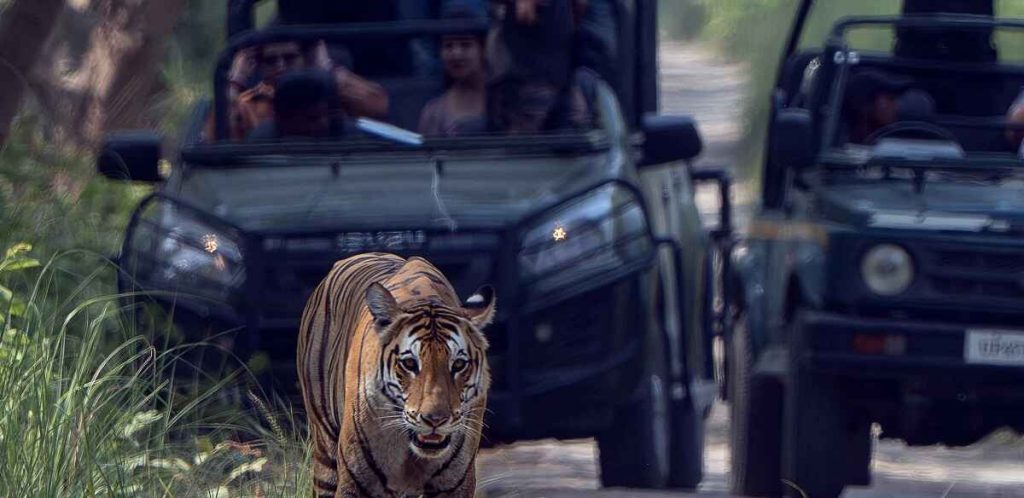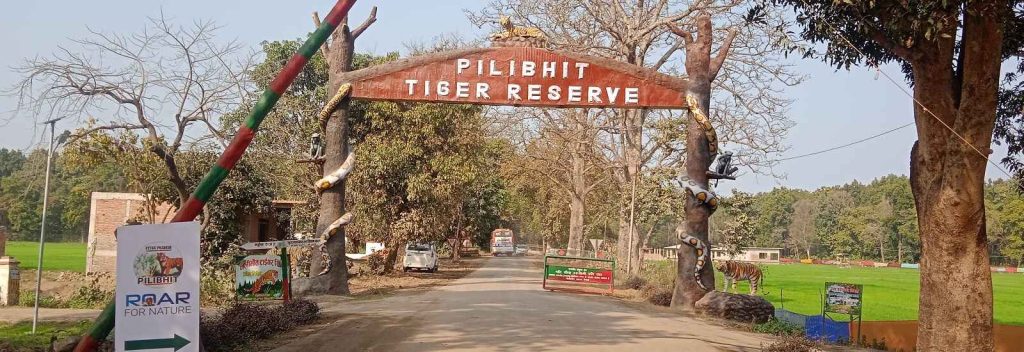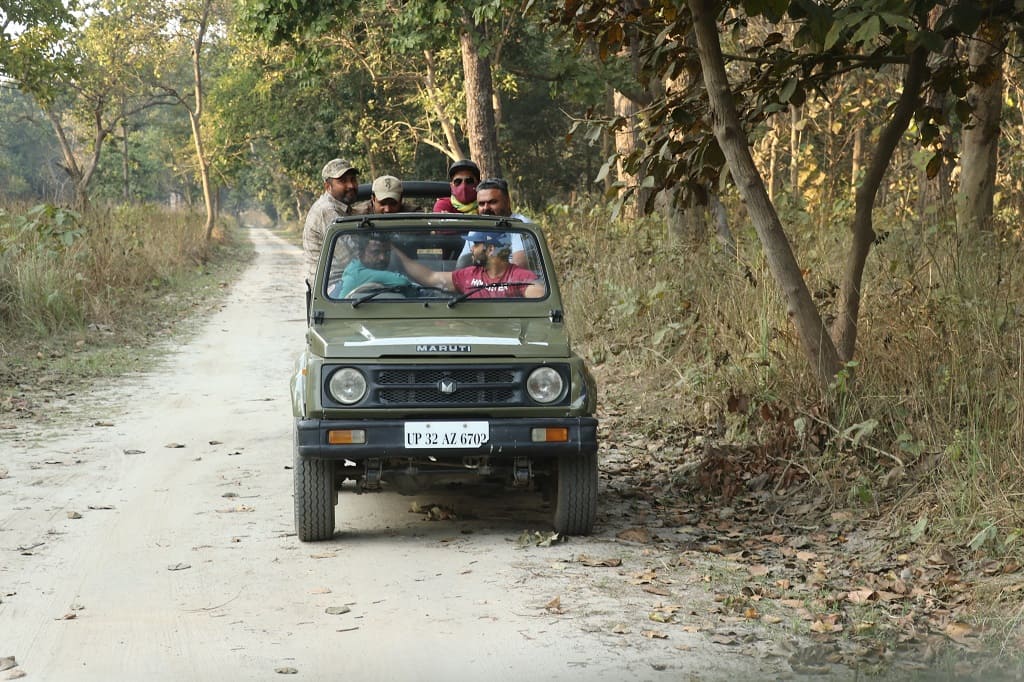Kishanpur Wildlife Sanctuary is located on the lap of Dudhwa Tiger Reserve that is hidden gem in the wild side in Terai region. The jungle safari of Kishanpur is full of excitement that varies between breathtaking tiger spotting and calm wetland bird watching through the dense jungles of Terai. This guide will provide you with all the information that you need to know before venturing out on a jungle safari in Kishanpur; this includes the safari timings, zones, permit requirements, what to carry, rules to observe, and the comparison of this place to its close neighbor attractions, such as the Pilibhit Tiger Reserve.
Kishanpur Safari Timings
Kishanpur jungle safari is done at the two recommended times of day:
![]() Morning Safari: 6.30 to 10.30 AM
Morning Safari: 6.30 to 10.30 AM
![]() Evening Safari: 2.30 PM / 6.30 PM
Evening Safari: 2.30 PM / 6.30 PM
The most suggestive months to visit are between November and May, although March to May are the best as the tiger observation can only be guaranteed because there is less vegetation during the season. Avoid the month of monsoon (June to October), since the sanctuary is closed.
Permits For Entry and Booking Process
In their efforts to get into the sanctuary, the tourists are required to get a valid entry permit, which entails:
![]() Charges on the safari vehicle.
Charges on the safari vehicle.![]() Guide charges.
Guide charges.![]() Forest department entry fee.
Forest department entry fee.
Online Permits booking or booking with the indulged eco-tour operators is allowed. You had better make an advanced booking, especially on weekends and on holidays when demand goes up.
During the visit, foreign tourists are required to have valid ID proofs and a copy of their passports. Indian citizens need to produce a government-issued photo ID (Aadhar, PAN, etc.).
Safari Zones Kishanpur
There are core and buffer zones in Kishanpur:
Jhadi Tal Zone (Core Zone): The most favorable place to see Bengal tigers, swamp deer, and leopards.
Padaria Beat, Bhira Range (Buffer Zone): Best place to go bird watching; also a good place to take a silent drive into nature.
Landscape is diverse; each zone has a different landscape. The zone has grassland and marshes, and a salt forest. Travellers can combine both zones in a series of safaris to have a full experience.

What to Pack for Jungle Safari
Good preparation can make your safari enjoyable. Here goes a short list:
Essentials:
![]() A legal ID document and a safari permit
A legal ID document and a safari permit
![]() Binoculars and camera (Batteries)
Binoculars and camera (Batteries)
![]() Water, refreshments, and light bites
Water, refreshments, and light bites
Clothing:
![]() Olive, Khaki, beige colored clothes (neutral color)
Olive, Khaki, beige colored clothes (neutral color)
![]() Cap or hat, sunglasses
Cap or hat, sunglasses
![]() A light jacket to be used on the morning safari
A light jacket to be used on the morning safari
Optional:
![]() Wildlife checklist or guidebook about birding
Wildlife checklist or guidebook about birding
![]() Power bank
Power bank
![]() Raincoat (going in pre/post monsoon)
Raincoat (going in pre/post monsoon)
![]() Do not wear flashy colors and strong perfume, as this can disrupt the animals.
Do not wear flashy colors and strong perfume, as this can disrupt the animals.
Safari Vehicle & Guide
Kishanpur provides open gypsy jeeps that come with guided forest means. One gypsy has a capacity of a maximum of 6 persons. They will inform you of the behavior of the wildlife, how to locate hard-to-see species, and how to walk in the forest.
They are vehicles that are on guided drive as opposed to self-drive safari, where a vehicle has to be driven under the control of a guide in order to ensure safety and adherence to forest regulations.
Safety Regulations and Guidelines of a Safari
Feeling considerate of the forest and its dwellers means a safe and ethical encounter. These are the rules to follow:
![]() When in a sanctuary, do not litter.
When in a sanctuary, do not litter.![]() Keep silent and do not use loud music or shouting.
Keep silent and do not use loud music or shouting.![]() Feed not animals.
Feed not animals.![]() Remain in your car at all times.
Remain in your car at all times.![]() Flash photography is not allowed.
Flash photography is not allowed.![]() Under the instructions of your guide, do as much as you…
Under the instructions of your guide, do as much as you…![]() It is a common space in the jungle – be good visitors.
It is a common space in the jungle – be good visitors.
Wildlife That You Will See
![]() Kishanpur falls under the Dudhwa and Pilibhit Tiger Reserve Terai Arc Landscape, which has rich biodiversity. The following are some of the well-known species:
Kishanpur falls under the Dudhwa and Pilibhit Tiger Reserve Terai Arc Landscape, which has rich biodiversity. The following are some of the well-known species:
![]() Royal Bengal Tiger, Swamp Deer (Barasingha), Leopard, Sloth Bear, Hog deer of India, Crocodiles & Turtles
Royal Bengal Tiger, Swamp Deer (Barasingha), Leopard, Sloth Bear, Hog deer of India, Crocodiles & Turtles
![]() More than 450 bird species, such as the fish eagles, hornbills, kingfishers, and vultures
More than 450 bird species, such as the fish eagles, hornbills, kingfishers, and vultures
![]() Jhadi Tal zone is perfect to spot tiger and deer, and Padaria beat is a great place to sight birds and for quiet drives.
Jhadi Tal zone is perfect to spot tiger and deer, and Padaria beat is a great place to sight birds and for quiet drives.

Where to stay – Accommodation Options
Eco-friendly homestays, jungle resorts, and forest rest houses can also be availed, just near Mailani and Bhira towns, by the visitors. The popular accommodations include jungle-themed rooms, local food, and help with booking safaris.
There is also the option of combined packages involving stays, meals, and safaris in Kishanpur, Dudhwa National Park, and even in Pilibhit Tiger Reserve, which will be ideal in terms of eco-tour vacations involving longer stays.
Combine with Pilibhit Tiger Reserve
The other must-visit destination is Pilibhit Tiger Reserve, an hour’s drive by road. It is the type of place that can provide a nice contrast to Kishanpur Sanctuary in terms of thick sal forests, tigers, Choka Beach, and the River Sharda.
A lot of eco tourists would devise a joint schedule where 2 to 3 days would be spent covering Kishanpur and Pilibhit. The common tour packages contain:
![]() Each reserve comprises a one-day jungle safari.
Each reserve comprises a one-day jungle safari.![]() Experience of cultural villages.
Experience of cultural villages.![]() Food, hikes, and trails.
Food, hikes, and trails.

Final Tips for Visitors
![]() Make reservations for your safari and accommodation ahead of time.
Make reservations for your safari and accommodation ahead of time.
![]() Bring cash, since there are few digital provisions around the gates to sanctuaries.
Bring cash, since there are few digital provisions around the gates to sanctuaries.
![]() You should never be in a rush when you are on safaris, since you do not get to see wildlife on every drive, and all the drives are worthwhile.
You should never be in a rush when you are on safaris, since you do not get to see wildlife on every drive, and all the drives are worthwhile.
![]() Eco-ethical travelling.
Eco-ethical travelling.
Conclusion
Whether it is your first visit to it or you are a well-established wildlife enthusiast, a jungle safari in Kishanpur Wildlife Sanctuary is bound to be such an adventure. Kishanpur is an area of dense sal forests, rare wildlife, and serene environs, and therefore provides a real and close wilderness experience to the Terai Arc. Join the trip with Pilibhit Tiger Reserve or Dudhwa National Park to make a longer eco-tour and discover, conserve, and admire all the wonders of nature.


 How To Reach At Kishanpur
How To Reach At Kishanpur
